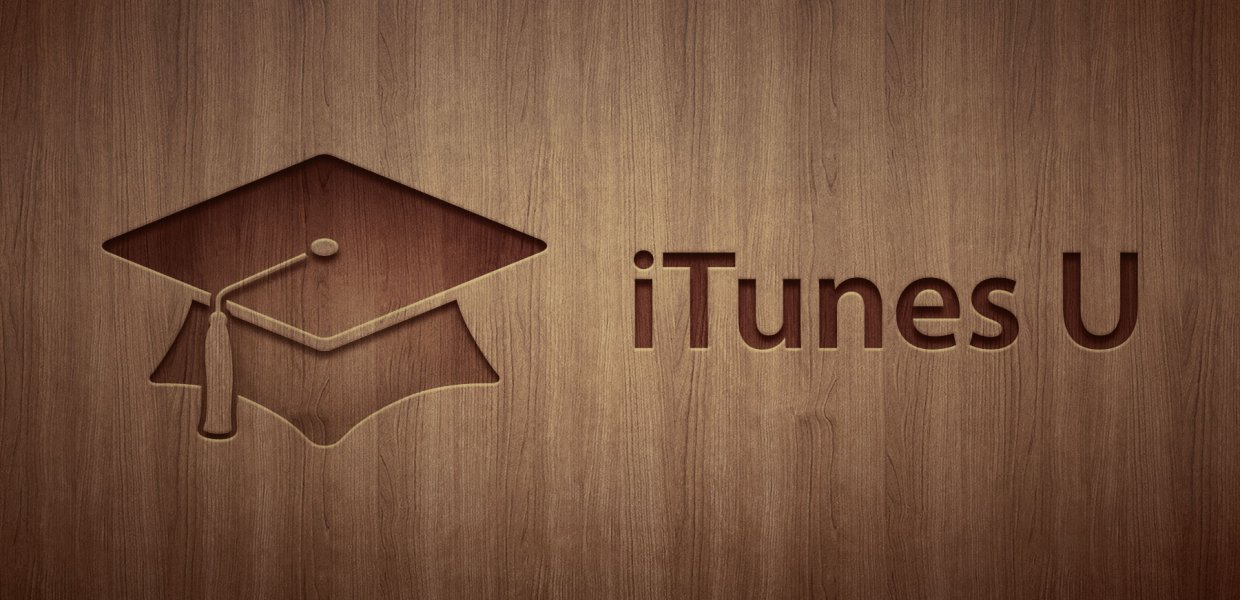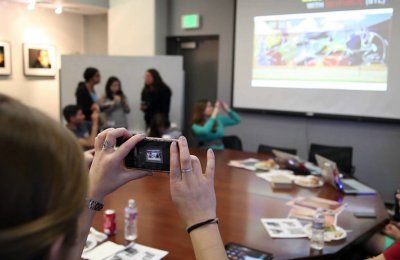USC Annenberg continues to find new ways to use digital technologies in the classroom.
In the latest project, School of Journalism Associate Director and Professor Bill Celis and Director of Web and Instructional Technology Services Wendy M. Chapman are leading the way for both the University of Southern California and USC Annenberg by creating digital courses on the newly updated iTunes U platform.
Celis and Chapman are combining two of Celis’ previous classes into one. It will be called "Urban America: Reporting on Its Neighborhoods and Schools" and is scheduled to be available on iTunes U in spring 2013. This open courseware class reflects an emerging national trend of providing academic information that anyone in the world can access.
“I love this project,” said School of Journalism Director Geneva Overholser. “Right now, with change as our constant companion and the future of the academy unsettled but also alive with new promise, Bill and Wendy are responding in just the right way – by leading us forward.”
Susan Metros, USC’s associate vice provost and associate chief information officer for technology-enhanced learning, said institutions of higher education have an obligation to support the free access to academically vetted information.
“The fact that Bill is willing to share his content is, to me, the new direction of learning,” Metros said. “It’ll just add to the knowledge base in his discipline and advance research in the field.”
Celis said the open courseware allows content and idea sharing among faculty and institutions.
“Schools like USC, Harvard, Stanford, MIT and a long list of others will help each other with best practices, shared content and ideas,” he said.
More than simply uploading video or audio of a lecture online, the new iTunes U platform contains learning tools similar to what a student might see in a brick-and-mortar classroom: a syllabus, handouts, assignments, quizzes, links to articles and books, and lectures.
“From the iTunes U app, students can play video or audio lectures and take notes that are synchronized with the lecture,” according to Apple Inc. “They can read books and view presentations. See a list of all the assignments for the course and check them off as they’re completed. And when (teachers) send a message or create a new assignment, students receive a push notification with the new information.”
The journalism course will examine social issues in schools and their surrounding neighborhoods. The previous courses were overhauled in 2010 to accommodate the aggressive infusion of technology and mobile reporting using iPads. The entire curriculum, including Celis’ instruction and students’ news gathering and reporting, was conducted via mobile reporting devices. They introduced E-books addressing contemporary education and school issues, and used more digital archival material to make the classes paperless.
Those classes helped Celis win the USC’s Prize for Teaching with Technology award in 2011 for his “outstanding achievements in teaching through the incorporation of technology into courses and curricula.”
The iTunes U course will be infused with even more technology-enhanced learning strategies, including interactive maps that show the status of equity lawsuits challenging school funding systems and more lectures on video, such as Celis providing historical and contemporary context for President Lyndon B. Johnson’s 1964 “Great Society” speech.
"I do think technology changes both teaching and learning," Celis said. "From my personal experience, it enhances everything that happens in a classroom."
That coincides with USC’s strategic vision, which says in part: "New technologies demand new literacies and modes of academic inquiry that students must master. This is particularly true of digital and multimedia literacy. USC is a national leader in the study of new literacies and new media with its strengths in cinematic arts, the humanities, communications, visual and cultural studies, advertising, and new technologies. Competence in new media is, in many ways, an extension of traditional forms of literacy. An appreciation of this connection can instill respect for intellectual depth and rigor."
To make the classes relevant, interesting and educational takes a large dose of one element, Celis said.
"The key here is collaboration, collaboration, collaboration," he said. "That is the prototypical relationship moving forward among faculty and instructional technologists."

“We couldn’t put this course on without each other,” Chapman said. “My team brings the technology, but Bill brings the content expertise and the well-established courses. He is willing to completely reexamine the courses, modernize them, and make room for the new technology.”
Metros said the support Chapman provides is invaluable.
“Not many schools have people as talented and skilled as she is,” Metros said. “Bill is the faculty member, the subject matter expert, but she’s the one helping build the actual interactive experiences. It really does take a specialist. You can’t expect a faculty member to go in and design an online course without instructional technology support.”
Metros commended both of them for using technology, and especially for not putting its importance ahead of the teaching and learning.
“They’re smart about how they use the technology,” Metros said. “It’s not about the quantity but the quality of the experience. Good teaching is good teaching – whether it is on ground or online. They also have continuously used robust analytics to find out what works and doesn’t work for their students.”
At the end of each course, Celis and Chapman survey the students to help strengthen the following class. They have continuously shared the information gleaned from the surveys and their experiences with a wide range of colleagues.
They have twice presented at USC’s Teaching with Technology conference, as well as given presentations at several national conferences. They have also twice been invited to Apple’s headquarters in Cupertino, Calif. to share best practices with other university faculty and staff involved with iTunes U. On Oct. 19, they will headline an event at USC's Center for Scholarly Technology where they will lead a faculty forum about creating online courses using Apple mobile technologies.
“Bill and Wendy are embracing new and enriching ways of teaching, and they are figuring out how to serve new audiences,” Overholser said. “And their method of doing it is the perfect collaborative model between a content person and a tech expert. We need more of this!”





